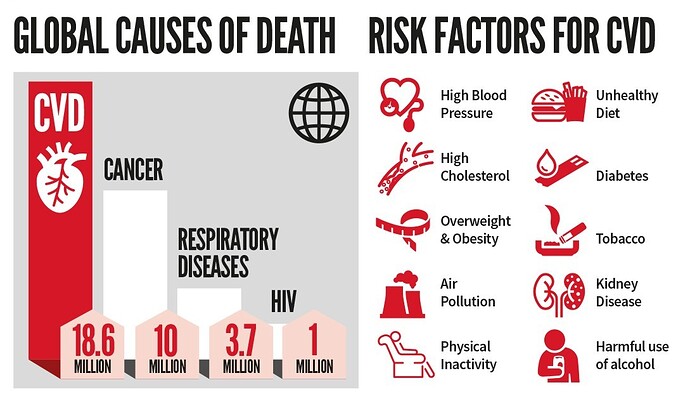What Are Cardiovascular Diseases?
Source: World Heart Federation, (2022).
Cardiovascular diseases (CVDs) are a group of diseases of the heart and blood vessels. They are usually associated with a build-up of fatty deposits inside the arteries (atherosclerosis) and an increased risk of blood clots (Cardiovascular Disease, 2022). In 2019, 32% of all global deaths (approximately 17.9 million) were attributed to cardiovascular disease (WHO, 2021). Four out of five CVDs deaths are due to heart attacks and strokes, and one-third of these deaths occur prematurely in people under 70 years of age(Cardiovascular Diseases, n.d.).
CVDs are associated with arterial damage in organs like the brain, heart, kidneys and eyes (Cardiovascular Diseases (CVDs), 2021). Examples of CVDs are; heart, cerebrovascular, peripheral-arterial, rheumatic, and congenital diseases. They also include deep vein thrombosis and pulmonary embolisms.
Some of the risk factors of CVDs are:
- Unhealthy diet consumption
- Physical inactivity
- Family history
- Ethnic background
- Tobacco use and harmful use of alcohol (Cardiovascular Diseases (CVDs), 2021).
CVDs are also caused by the effect of comorbidities like diabetes.
Signs may show up in individuals as “intermediate risk factors”, like:
- An elevated blood pressure.
- An elevated blood glucose level(fasting blood glucose between 110 and 125 mg/d; 6.1–6.9 mmol/L), and blood lipids level(Above 200 mg/dl).
- Overweight and obesity.
When unmeasured or unmonitored, an uncontrolled increase can lead to a heart attack, stroke, heart failure and other complications.
Here are some CVDs prevention tips
- Avoid/quit smoking
- Eat healthily
- Exercise regularly
- Maintain a healthy weight
- Avoid/ reduce your alcohol consumption.
Got any other prevention tips for CVDs?
Let us know in the comment section.
